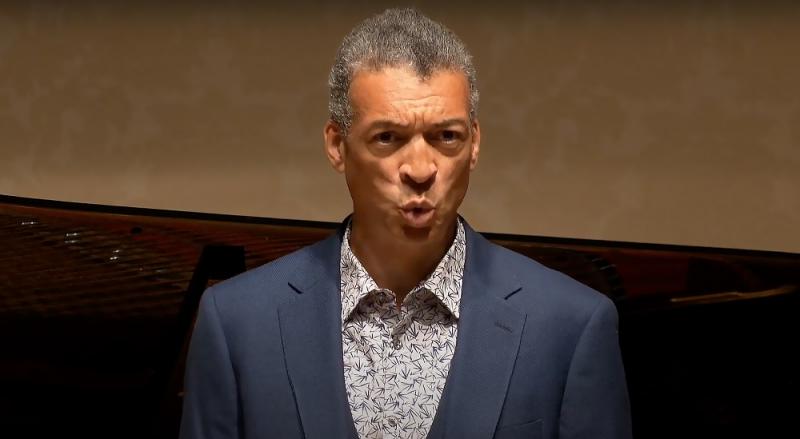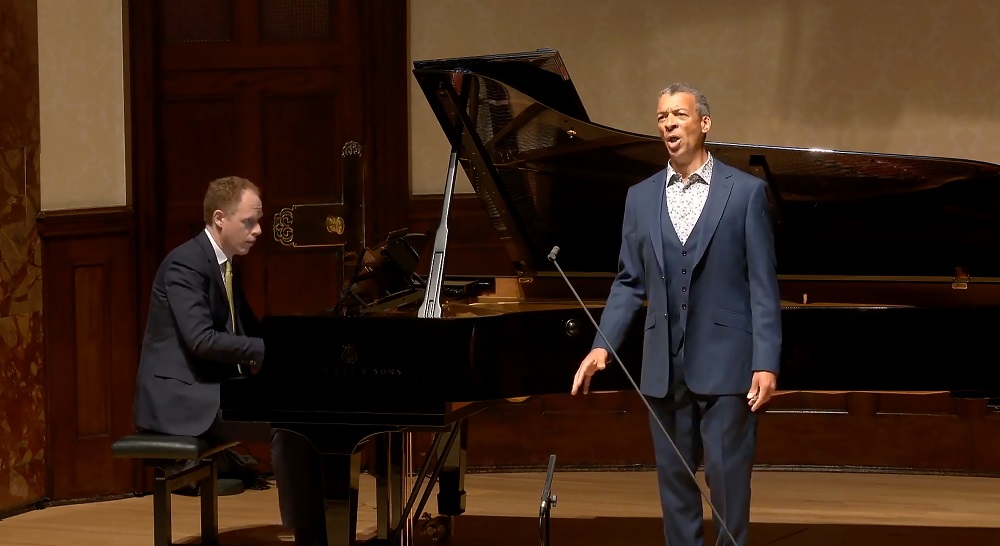Roderick Williams, Joseph Middleton, Wigmore Hall online/BBC Radio 3 review - gender roles in song examined | reviews, news & interviews
Roderick Williams, Joseph Middleton, Wigmore Hall online/BBC Radio 3 review - gender roles in song examined
Roderick Williams, Joseph Middleton, Wigmore Hall online/BBC Radio 3 review - gender roles in song examined
A strong case for egalitarianism in all art song

I'm not sure if it was the beauty of Roderick Williams’s velvety vocals, the poignant delight of seeing a live performance in a concert hall after all this time, or my generally unusual frame of mind during lockdown that caused me to immediately burst into tears at the opening bars of Schubert’s "Gretchen am spinnrade" ("Gretchen at the Spinning Wheel"), but the fact no other audience members were
Woman’s Hour – a recital so called because of its length, but also because Williams has chosen to sing works usually sung by women – invited the audience to consider the question "Should a man be singing these songs?". Though these works are about female outlooks and experiences, they are predominantly male settings of male poetry, so to hear a man seek to empathise with the female protagonist seems rather apt. In fact, it feels odd that it’s an oddity. As Williams himself says, "playing and singing songs is an act of empathy, of imagination. It doesn’t matter who we are so long as we can access in some way emotions and feelings we feel to be true."
Williams opened with three songs by Schubert – "Gretchen am Spinnrade", "Der Tod und das Mädchen" ("Death and the Maiden") and "Die junge Nonne" ("The Young Nun"). He wonderfully portrayed the wrought angst of the young Gretchen, pregnant and spurned by her lover, the trepidation of the young girl approaching death and the celestial bliss of the novice. Moving on to Brahms, Middleton’s exquisite playing captured the bird’s tender fragility in "An die Nachtigall" ("To the Nightingale") and gave a rich, textured backdrop to "Mädchenlied" and "Das Mädchen".
Turning to some music written by a woman – Clara Schumann – the second of her Three Songs, "Liebst du um Schönheit" ("If You Love Beauty"), setting the same Rückert poem which Mahler was to turn to, saw a lyrical and tender performance from both singer and pianist (Middleton and Williams pictured below). Back to Brahms, this set of seven songs ended as it began with another song inspired by a nightingale. Middleton’s delicate ornamentation in the opening bars beautifully emulated the chirp of a bird, and Williams’s sensitive portrayal of the nightingale’s bittersweet cry was a lovely end to this group of pieces.  The recital ended with Robert Schumann’s cycle Frauen-Liebe und Leben (A Woman's Love and Life), settings of poetry by Adelbert von Chamisso. Chamisso, so BBC Radio 3 presenter Martin Handley told us, was an advocate for gender equality, which may surprise those of us with qualms about this particular cycle. Again it’s male music to male words, but it's the central message that a women’s fulfillment lies in loving her husband and subsequently his child that’s particularly jarring. It can’t be ignored though that the cycle contains some stunning music and Williams and Middleton tease out a kaleidoscope of emotion from Schumann’s score (even with a slight hiccup in the fifth song, "Helft mir, ihr Schwestern" - "Help Me, Sisters").
The recital ended with Robert Schumann’s cycle Frauen-Liebe und Leben (A Woman's Love and Life), settings of poetry by Adelbert von Chamisso. Chamisso, so BBC Radio 3 presenter Martin Handley told us, was an advocate for gender equality, which may surprise those of us with qualms about this particular cycle. Again it’s male music to male words, but it's the central message that a women’s fulfillment lies in loving her husband and subsequently his child that’s particularly jarring. It can’t be ignored though that the cycle contains some stunning music and Williams and Middleton tease out a kaleidoscope of emotion from Schumann’s score (even with a slight hiccup in the fifth song, "Helft mir, ihr Schwestern" - "Help Me, Sisters").
Giving Brahms’s "Sapphische Ode" as an encore, Williams told us that it’s a song he’s always wanted to sing, after his experience as a young singer of having it rejected as a choice for a competition on the grounds that it is a "woman’s song". His performance of it was heartfelt and touching, and it's clear it's a work he has a strong personal connection with.
It’s an unusual and delightful treat to hear some of these songs performed with the deeper timbre of a baritone. As Williams explained, this gender divide in the world of lieder is a relatively new convention, only becoming the norm in the past hundred years. Surely that’s doing our singers a disservice, by shutting off some incredible music to them based solely on their gender? Williams states in this programme he sought to "encourage people of any gender to feel like the whole wealth of art song belongs to them to explore". And whatever your views on sex, gender and equality, that seems unarguable.
- Both concerts can be seen on the Wigmore Hall website and heard on BBC Radio 3; the series continues on both
- More classical reviews on theartsdesk
rating
Explore topics
Share this article
The future of Arts Journalism
You can stop theartsdesk.com closing!
We urgently need financing to survive. Our fundraising drive has thus far raised £49,000 but we need to reach £100,000 or we will be forced to close. Please contribute here: https://gofund.me/c3f6033d
And if you can forward this information to anyone who might assist, we’d be grateful.

Subscribe to theartsdesk.com
Thank you for continuing to read our work on theartsdesk.com. For unlimited access to every article in its entirety, including our archive of more than 15,000 pieces, we're asking for £5 per month or £40 per year. We feel it's a very good deal, and hope you do too.
To take a subscription now simply click here.
And if you're looking for that extra gift for a friend or family member, why not treat them to a theartsdesk.com gift subscription?
more Classical music
 Kilsby, Parkes, Sinfonia of London, Wilson, Barbican review - string things zing and sing in expert hands
British masterpieces for strings plus other-worldly tenor and horn - and a muscular rarity
Kilsby, Parkes, Sinfonia of London, Wilson, Barbican review - string things zing and sing in expert hands
British masterpieces for strings plus other-worldly tenor and horn - and a muscular rarity
 From Historical to Hip-Hop, Classically Black Music Festival, Kings Place review - a cluster of impressive stars for the future
From quasi-Mozartian elegance to the gritty humour of a kitchen inspection
From Historical to Hip-Hop, Classically Black Music Festival, Kings Place review - a cluster of impressive stars for the future
From quasi-Mozartian elegance to the gritty humour of a kitchen inspection
 Shibe, LSO, Adès, Barbican review - gaudy and glorious new music alongside serene Sibelius
Adès’s passion makes persuasive case for the music he loves, both new and old
Shibe, LSO, Adès, Barbican review - gaudy and glorious new music alongside serene Sibelius
Adès’s passion makes persuasive case for the music he loves, both new and old
 Anja Mittermüller, Richard Fu, Wigmore Hall review - a glorious hall debut
The Austrian mezzo shines - at the age of 22
Anja Mittermüller, Richard Fu, Wigmore Hall review - a glorious hall debut
The Austrian mezzo shines - at the age of 22
 First Person: clarinettist Oliver Pashley on the new horizons of The Hermes Experiment's latest album
Compositions by members of this unusual quartet feature for the first time
First Person: clarinettist Oliver Pashley on the new horizons of The Hermes Experiment's latest album
Compositions by members of this unusual quartet feature for the first time
 Gesualdo Passione, Les Arts Florissants, Amala Dior Company, Barbican review - inspired collaboration excavates the music's humanity
At times it was like watching an anarchic religious procession
Gesualdo Passione, Les Arts Florissants, Amala Dior Company, Barbican review - inspired collaboration excavates the music's humanity
At times it was like watching an anarchic religious procession
 Classical CDs: Camels, concrete and cabaret
An influential American composer's 90th birthday box, plus British piano concertos and a father-and-son duo
Classical CDs: Camels, concrete and cabaret
An influential American composer's 90th birthday box, plus British piano concertos and a father-and-son duo
 Cockerham, Manchester Camerata, Sheen, Martin Harris Centre, Manchester review - re-enacting the dawn of modernism
Two UK premieres added to three miniatures from a seminal event of January 1914
Cockerham, Manchester Camerata, Sheen, Martin Harris Centre, Manchester review - re-enacting the dawn of modernism
Two UK premieres added to three miniatures from a seminal event of January 1914
 Kempf, Brno Philharmonic, Davies, Bridgewater Hall, Manchester review - European tradition meets American jazz
Bouncing Czechs enjoy their Gershwin and Brubeck alongside Janáček and Dvořák
Kempf, Brno Philharmonic, Davies, Bridgewater Hall, Manchester review - European tradition meets American jazz
Bouncing Czechs enjoy their Gershwin and Brubeck alongside Janáček and Dvořák
 Solomon, OAE, Butt, QEH review - daft Biblical whitewashing with great choruses
Even a top soprano and mezzo can’t make this Handel paean wholly convincing
Solomon, OAE, Butt, QEH review - daft Biblical whitewashing with great choruses
Even a top soprano and mezzo can’t make this Handel paean wholly convincing
 Two-Piano Gala, Kings Place review - shining constellations
London Piano Festival curators and illustrious friends entertain and enlighten
Two-Piano Gala, Kings Place review - shining constellations
London Piano Festival curators and illustrious friends entertain and enlighten
 Echo Vocal Ensemble, Latto, Union Chapel review - eclectic choral programme garlanded with dance
Beautiful singing at the heart of an imaginative and stylistically varied concert
Echo Vocal Ensemble, Latto, Union Chapel review - eclectic choral programme garlanded with dance
Beautiful singing at the heart of an imaginative and stylistically varied concert

Add comment